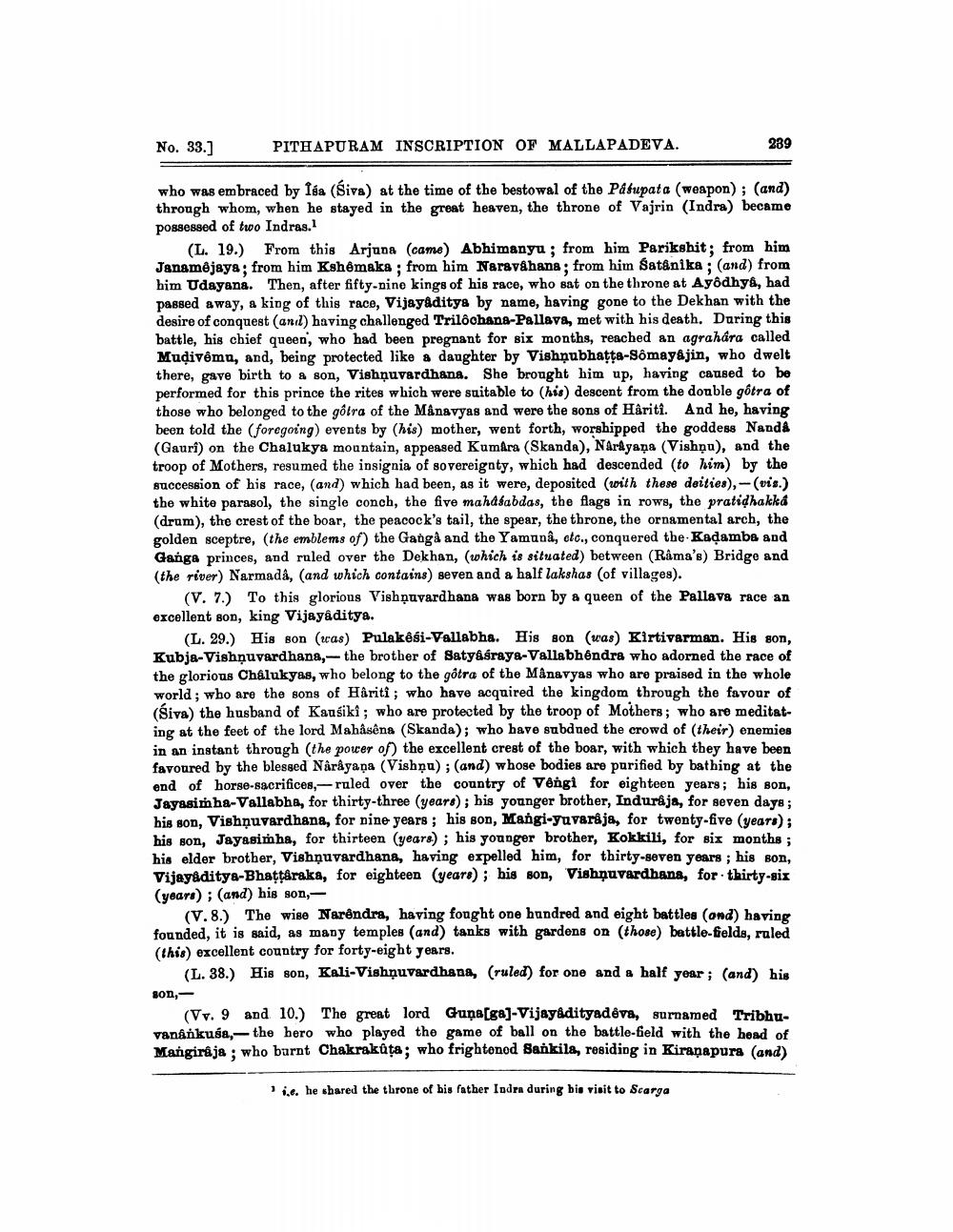________________
No. 33.]
PITHAPURAM INSCRIPTION OF MALLAPADEVA.
289
who was embraced by Isa (Śiva) at the time of the bestowal of the Påbupata (weapon); (and) through whom, when he stayed in the great heaven, the throne of Vajrin (Indra) became possessed of two Indras.
(L. 19.) From this Arjuna (came) Abhimanyu : from him Parikshit: from him Janamêjaya; from him Kshēmaka : from him Naravahana; from him Satánika; (and) from him Udayana. Then, after fifty-nine kings of his race, who sat on the throne at Ayodhyl, had passed away, a king of this race, Vijayaditya by name, having gone to the Dekhan with the desire of conquest (anal) having challenged Trilochana-Pallava, met with his death. During this battle, his chief queen, who had been pregnant for six months, reached an agrahára called Mudivêma, and, being protected like a daughter by Vishnubhatta-Sômaydjin, who dwelt there, gave birth to a son, Vishnuvardhana. She brought him up, having caused to be performed for this prince the rites which were suitable to (his) descent from the double gôtra of those who belonged to the gôira of the Mânavyas and were the sons of Hâriti. And he, having been told the foregoing) events by (his) mother, went forth, worshipped the goddess Nanda (Gauri) on the Chalukya mountain, appeased Kumara (Skanda), Narayana (Vishņu), and the troop of Mothers, resumed the insignia of sovereignty, which had descended (to him) by the succession of his race, (and) which had been, as it were, deposited (with these deities),-(vis.) the white parasol, the single conch, the five mahasabdas, the flags in rows, the pratidhakka (drum), the crest of the boar, the peacock's tail, the spear, the throne, the ornamental arch, the golden sceptre, the emblems of the Ganga and the Yamanâ, etc., conquered the Kadambs and Ganga princes, and ruled over the Dekhan, (which is situated) between (Râma's) Bridge and (the river) Narmada, (and which contains) seven and a half lakshas (of villages).
(V. 7) To this glorious Vishnuvardhana was born by a queen of the Pallava race an excellent son, king Vijayaditya.
(L. 29.) His Bon (vas) Pulakési-Vallabha. His son (was) Kirtivarman. His son, Kubja-Vishnuvardhana,- the brother of Satyasraya-Vallabhéndra who adorned the race of the glorious Chalukyas, who belong to the gôtra of the Mânavyas who are praised in the whole world; who are the sons of Hâriti; who have acquired the kingdom through the favour of (Śiva) the husband of Kausiki; who are protected by the troop of Mothers; who are meditating at the feet of the lord Mahasena (Skanda); who have subdued the crowd of (their) enemies in an instant through the power of the excellent crest of the boar, with which they have been favoured by the blessed Narayana (Vishra); (and) whose bodies are purified by bathing at the end of horse-sacrifices, -ruled over the country of Vêngi for eighteen years; his son, Jayasimha-Vallabha, for thirty-three (years); his younger brother, Indurája, for seven days; his son, Vishnuvardhana, for nine years ; his son, Mangi-yuvaråja, for twenty-five (years); his son, Jayasimha, for thirteen (years) ; his younger brother, Kokkili, for six months; his elder brother, Vishņuvardhana, having expelled him, for thirty-seven years ; his son, Vijayaditya-Bhattaraka, for eighteen (years); his son, Vishnuvardhana, for thirty-six (years) ; (and) his son,
(V.8.) The wire Narendra, having fought one hundred and eight battles (and) having founded, it is said, as many temples (and) tanks with gardens on (those) battle-fields, ruled (this excellent country for forty-eight years.
(L. 38.) His son, Kali-Vishņuvardhana, (ruled) for one and a half year; (and) his son, -
(Vy. 9 and 10.) The great lord Guña[ga]-Vijayadityadeva, surnamed Tribhuvanänkusa, - the hero who played the game of ball on the battle-beld with the head of Mangiraja ; who burnt Chakrakûța; who frightened Sankila, residing in Kiranapura (and)
Die he shared the throne of his father Indra during bia visit to Scarga




